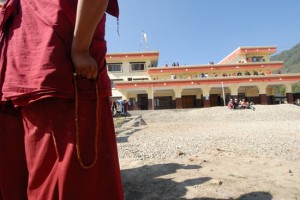
The Tibetan Refugee Reception Center in Kathmandu, Nepal. (Jonathan Green)
The arrests of the Tibetan community leaders in Kathmandu follow international concerns over the often brutal treatment by Nepalese police of Tibetan protestors in Kathmandu during the past three months, which in some cases appears to have been directed by Chinese Embassy officials present behind police lines at the demonstrations.
Mary Beth Markey, Vice President of Advocacy at the International Campaign for Tibet, said today: “These arrests are deeply disturbing at a time of transition to a new government in Nepal, when Tibetans, already vulnerable in Nepal, are very nervous about Chinese government influence and presence in Kathmandu. ICT calls on Nepal’s new democratic leaders and the international community to be vigilant of China’s intentions in Nepal and the impact of its influence on long-staying Tibetan refugees in Nepal. We call for the immediate release of these three prominent Tibetans.”
The three Tibetans were required to sign a detention order letter issued by the Chief District Officer in Kathmandu, who is under the authority of Nepal’s Home Ministry. The letter stated that the demonstrations in Kathmandu have affected “the law and order situation” of Nepal and, if they do not stop, may “harm the bilateral and friendly relationship with China”. Officials of the UN High Commissioner for Human Rights and some foreign embassies in Kathmandu are following the cases closely, but there has been no public response by the new Nepal government.
The three Tibetans were among 12 community figures, named on an official list, suspected of involvement in the Kathmandu protests. It is not known if the detentions are linked to the imminent arrival of the Olympic flame in Lhasa, Tibet’s capital, on Saturday June 21, but they are certainly linked to the increasing irritation of Chinese government authorities over the unremitting public and emotional expression of Tibetan solidarity in Nepal in recent weeks. The Chinese ambassador in Kathmandu, Zheng Xianglin, has recently made strong statements against the Dalai Lama in the Nepalese press. In one pro-Chinese weekly publication, the People’s Review, Zheng accused the Dalai Lama and the Tibetan government in exile of directly instigating the protests in Nepal (June 19-25).
Since the wave of protests broke out in Tibet on March 10, thousands of Tibetans in Nepal have jeopardized their safety and security in Nepal to express their opposition to Chinese rule in Tibet. The Nepal border with Tibet, closed in preparation of the Olympic torch ascent on Mount Everest on May 8, remains sealed off and the presence of Chinese border troops stepped up.
China’s acute sensitivity over Tibet continues to be a primary feature of China-Nepal relations, and Beijing has been quick to extract statements from new Nepalese government leaders, including the Maoist Prachanda, that Nepal will not to tolerate ‘anti-China’ activities on its soil.

